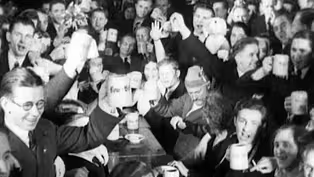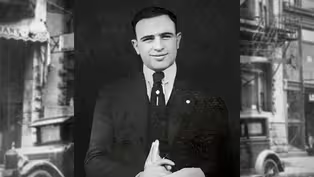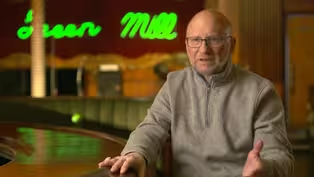Chicago Stories
Catching Capone
Clip: 11/1/2024 | 7m 14sVideo has Closed Captions
A tax evasion charge brings down Al Capone.
After the St. Valentine’s Day Massacre, federal authorities were set on sending Al Capone to prison. It would be a tax evasion charge that would bring down Capone.
Problems playing video? | Closed Captioning Feedback
Problems playing video? | Closed Captioning Feedback
Chicago Stories is a local public television program presented by WTTW
Lead support for CHICAGO STORIES is provided by The Negaunee Foundation. Major support is provided by the Abra Prentice Foundation, Inc. and the TAWANI Foundation.
Chicago Stories
Catching Capone
Clip: 11/1/2024 | 7m 14sVideo has Closed Captions
After the St. Valentine’s Day Massacre, federal authorities were set on sending Al Capone to prison. It would be a tax evasion charge that would bring down Capone.
Problems playing video? | Closed Captioning Feedback
How to Watch Chicago Stories
Chicago Stories is available to stream on pbs.org and the free PBS App, available on iPhone, Apple TV, Android TV, Android smartphones, Amazon Fire TV, Amazon Fire Tablet, Roku, Samsung Smart TV, and Vizio.
Providing Support for PBS.org
Learn Moreabout PBS online sponsorshipCapone's larger-than-life public popularity evaporated.
(guns banging) The St. Valentine's Day massacre sent shock waves throughout the country.
(soft music) The violence ignited public outcry.
Many Americans were no longer willing to turn a blind eye to gangland bloodshed in exchange for access to illicit booze.
- The local authorities, the mayor, et cetera, they don't seem to be able to do anything about this guy.
Some of Chicago's citizens went to Washington, D.C., and said to the president of the United States, "Can you do something about this guy, Capone?
I mean, this is a problem."
- I don't think Capone had anything to do with the Valentine's Day massacre.
We know for a fact that he wasn't there.
He was in Miami when it occurred.
He knew that the FBI and the IRS were breathing down his neck.
There's just no reason to think that he would've ordered this hit.
There's just no logic to it.
- He didn't go in there and shoot those guys himself.
He made sure he was out of town, and he didn't use faces from his men, from his gang, whose faces will be recognized by the North Side gangsters.
But it was definitely a Capone operation.
- But we'll never know for sure because the crime, all these years later, remains unsolved.
- [Narrator] While Capone's involvement has ignited historical debate for decades, after the massacre, newly-elected President Herbert Hoover leveled a mandate: get Capone.
- He wants to send the message that he's going to be tough on crime.
And what better way to send that message, take out the most famous criminal in America.
- [Narrator] Al Capone became Public Enemy Number One.
- And really, once he started to lose control of the public's opinions, that news attention turned negative, and it stayed negative, and that certainly hurt him as he went along.
- [Voiceover] "They've hung everything on me but the Chicago Fire."
- And we know he was never convicted of murder or he was never convicted of breaking the bootlegging laws, although he did it, you know, thousands of times.
- [Narrator] The Feds tapped Prohibition agent Eliot Ness to raid Capone's breweries and distilleries.
Ness and his incorruptible agents did rack up Prohibition charges and cut into Capone's profits.
But Ness didn't mastermind Capone's downfall like books and movies gave him credit for, including 1987's "The Untouchables."
- Eliot Ness gets a lot of attention because he's breaking down doors of breweries and he's calling reporters to come with him and getting his picture taken among the broken bottles of beer.
So he's very good at public relations, but he's not making a dent in the Capone operation.
There's no way to really tie him even to the bootlegging because there's no books.
- [Narrator] Instead, it was a dogged United States attorney in Chicago named George E. Q. Johnson who went to work on a new, yet decidedly less sensational angle, pinning Capone on tax evasion.
- The job falls to the accountants for the IRS.
So U.S. Attorney George Johnson makes the decision that tax charges are the best we can do.
"I'll take it," you know, anything just to get him in jail and to get him off the streets.
(pensive music) - [Narrator] In February 1929, prosecutors got an unlikely break when Capone was subpoenaed from his Florida home, wanted for questioning in a small-time bootlegging charge in Chicago.
- Now, Al Capone's private attorney filed an affidavit with the court from Capone's doctor.
That affidavit said that Capone was too ill to travel and had been laid up in bed for six weeks.
The U.S. Attorney's Office called in the FBI to determine was this true or was Al Capone lying?
- [Narrator] FBI Agents headed to Miami and discovered Capone wasn't laid up.
He was living large, spending his days at the racetrack and on fishing trips.
Capone testified in Chicago three weeks later.
- As he was leaving the courtroom, he was arrested on contempt of court charges.
He did bail out for $5,000, but then he went on two months later to be arrested in Philadelphia on weapons charges with his bodyguard.
So he did approximately one year in a Philadelphia prison.
It was just the beginning of the end for Mr. Capone.
- [Narrator] But hard time was different for Capone than most prisoners.
- Capone had a way of winning over his wardens.
He would let them borrow his car, he would pay them to allow him certain luxuries.
So these wardens, I think they kind of liked Capone and they cut him some favors from time to time.
- [Narrator] Meanwhile in Chicago, George Johnson, aided by an equally methodical accountant named Frank Wilson, worked day and night.
- Frank Wilson is this forensic accountant working for the IRS.
He's got these bottle thick glasses and he looks like a total geek.
But he's a bulldog.
He has been fighting corruption his entire career and he just will not let go until he gets Capone.
- [Narrator] Wilson discovered forgotten gambling ledgers, confiscated from Capone's days in Cicero.
- They're literally, like, just going through boxes.
And they find a guy who was one of the accountants and they put the screws to him.
And they find a couple of ledgers, and they find ledgers that appear to have Capone's name written on them.
- [Narrator] The feds already had eye-popping evidence of Capone's lavish spending.
But the ledgers revealed something new, proof Capone earned at least some income from gambling, yet he paid no income taxes.
Still, Johnson's team was tentative, afraid that the evidence could be too circumstantial to stick.
In July 1931, they offered Capone a plea deal to serve two and a half years in prison.
Capone jumped at the offer.
- It's pulled out from under him, and they go to trial, and everything about this trial smells fishy, like Capone never has a chance.
The jurors that they choose are thrown out.
Some people think that Capone had tainted the jury pool.
And the judge throws them out at the last minute, brings in jurors who had all served on other Prohibition juries and had all voted for conviction.
- [Narrator] As Capone's trial began, a crush of press and curious Chicagoans descended on the courthouse.
It was the trial of the century.
(tense music) (people chattering) 11 days later, Federal Judge James H. Wilkerson handed down Capone's sentence: 11 years in prison.
- At the time, Al Capone was such a huge figure in the Chicago public eye.
Really, it was the quintessential story of good versus evil, G-men versus gangsters.
It's easy to feel as though you have a stranglehold on Chicago and you're invincible, but no one is above the law, not even Al Capone.
Video has Closed Captions
Clip: 11/1/2024 | 4m 11s | Al Capone and Johnny Torrio capitalize on Prohibition. (4m 11s)
Video has Closed Captions
Clip: 11/1/2024 | 6m 6s | Al Capone was born in Brooklyn and made his way to Chicago as a young man. (6m 6s)
Extended Interview: Dave Jemilo, Owner of The Green Mill
Video has Closed Captions
Clip: 11/1/2024 | 4m 35s | Dave Jemilo shares the lore behind the famous cocktail bar Al Capone frequented. (4m 35s)
Providing Support for PBS.org
Learn Moreabout PBS online sponsorshipSupport for PBS provided by:
Chicago Stories is a local public television program presented by WTTW
Lead support for CHICAGO STORIES is provided by The Negaunee Foundation. Major support is provided by the Abra Prentice Foundation, Inc. and the TAWANI Foundation.


















